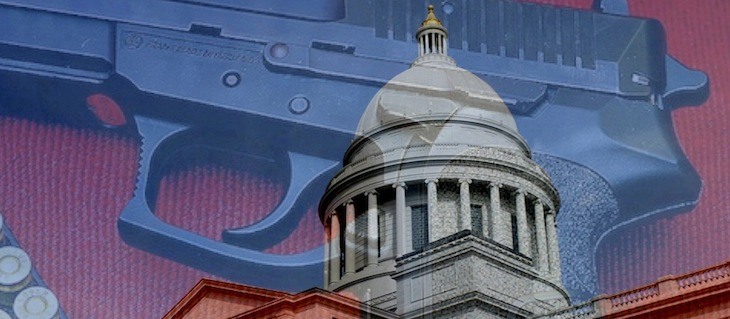House Committee passes Stand Your Ground bill; Senate panel approves voter ID for provisional ballots measure
by February 23, 2021 5:56 pm 1,621 views

A controversial ‘stand your ground’ bill passed the House Judiciary Committee on Tuesday (Feb. 23), just three weeks after it initially failed. SB 24 by Sen. Bob Ballinger, R-Ozark, would end the duty to retreat when using physical or deadly force.
Following a voice-vote, a roll call was requested for a final vote count and it passed 10-9.
Only 10 votes were needed for the proposal to pass out of committee instead of 11. House rules allow for one less vote for a majority if the Speaker of the House serves on the committee and is not present to vote. Speaker Matthew Shepherd, R-El Dorado, was not present.
Tuesday’s debate started with Rep. Aaron Pilkington, R-Knoxville, proposing an amendment to the bill that attempted to address issues raised by gun rights owners. However, the amendment, which failed on a 11-7 vote, caused prosecuting attorneys to oppose the measure. The debate centered around the phrase “right to be there” versus “lawfully present.”
“Some believe that ‘right to be there’ is stronger language than ‘lawfully present,’” Pilkington said initially.
His proposed amendment said, “Lawfully present means that a person is at or in a location and is not committing criminal trespass or criminal trespass on premises located in unincorporated area for the purpose of committing a serious felony such as arson, theft, burglary, murder, or rape.”
After the amendment was defeated, the House Judiciary Committee allowed public comments and then voted to approve the unamended bill.
SB 24 ends the duty to retreat if the person using the deadly force is lawfully present, has reasonable belief he is being threatened, is not engaged in criminal or gang activity, and is not a felon or the initial aggressor.
“Obviously, very disappointed, we’re thankful for the nine committee members who did vote no today and we’re grateful that they chose to listen to the overwhelming public opposition to this policy – but it is very clear that Arkansans do not want this policy. We know that it just adds confusion to our self-defense laws, and it only encourages more violence,” said Kate Fletcher, spokesperson for Moms Demand Action, which advocates for stricter gun control laws.
Fletcher said the group would continue efforts to try and defeat the bill.
Rep. Pilkington, who was not available for an on-camera interview, issued a statement saying he was pleased with the passage of SB 24 and expects it to pass on the House floor. Republicans hold a 78-22 margin over Democrats in the House. Only 51 votes are needed for passage.
“I know this was a complicated vote for some members and I appreciate their patience. I also appreciate the participation of all members of the House Judiciary Committee who I feel approach these issues with candor and mutual respect,” Pilkington added.
PHOTO ID FOR PROVISIONAL VOTING CLEARS SENATE COMMITTEE
At the other end of the state capitol, another controversial bill was being debated. HB 1112 by Rep. Mark Lowery, R-Maumelle, would eliminate signature verification of provisional ballots and require photo identification for a provisional ballot to be counted.
The measure passed Tuesday (Feb. 23) through the Senate State Agencies and Governmental Affairs Committee. Lowery said he introduced the bill because he’s worried about the integrity of the election process in Arkansas.
Lowery admitted he didn’t have any specific instances of voter fraud being tied to a lack of voter photo identification, but said overwhelming numbers of Republicans, Democrats, and Independents support photo identification. He cited polls that showed up to 80% of voters support some form of photo identification.
It was noted during a lengthy committee session concerning the bill that during the 2020 election about 2,700 provisional ballots with sworn signatures were tabulated, and there was not a single instance of voter fraud with those ballots. Several members of the public and elected officials pointed out that many, if not all, of these ballots would have been disqualified if this bill had been law during the previous election.
Lowery said the system doesn’t have a method to verify those signatures. He said it took weeks in some cases to count provisional ballots and election workers don’t have the training to verify signatures. Others in support of the bill noted that many activities including owning a bank account require a photo identification.
“There’s no way to do any type of follow-up,” he said.
Sen. Breanne Davis, R-Russellville, said she was concerned the bill would disproportionately impact seniors and the disabled. Davis said she can envision many scenarios where voters from these groups may not have a photo ID or might forget it when going to a polling place, and they may not have the means to make a second trip.
“To me, it’s putting a heavier burden on certain people,” she said.
Before the bill was voted upon, Sen. Bart Hester, R-Cave Springs, said he agreed with Davis. He asked if the bill could possibly be amended to exclude seniors and the disabled. No action was taken on his suggestion.
Several others who spoke against the bill noted that sworn signatures are a valid form of identification recognized by state and federal governments. Those seeking an absentee or provisional ballot still have to provide an address, birthdate and other information before a ballot is issued. It was also noted that there have only been three credible instances of voter fraud in the state in the last 20 years.
One member of the public mused that the bill seemed to be “a solution in search of a problem.”
Editor’s note: Marine Glisovic, senior political reporter for KATV, and George Jared co-authored this story.
